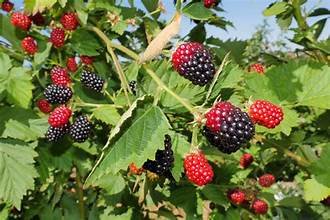
Blackberry
Once considered a seasonal delight, you’ll likely find blackberries in the grocery store year-round these days. As large as your thumb and as sweet as can be, these succulent berries are both tasty and nutritious.
“Throughout history, people have used blackberry fruits, leaves and brambles to heal a wide range of illnesses,” says registered dietitian Julia Zumpano, RD. “Though modern medicine has replaced these medicinal uses, we’re learning that blackberries have many other health benefits.”
Are blackberries healthy?
The short answer is yes. Blackberries are packed with vitamins, minerals, fiber and antioxidants. “These nutrients are essential for good health,” says Zumpano. “And research studies show that antioxidants may reduce inflammation and prevent many diseases, including cancer.”
Blackberries are also low in calories and carbs. One cup has 62 calories and 13.8 grams of carbohydrates. This gives you the green light to fully enjoy them. Here are some of the major benefits blackberries provide.
1. Boosts your body functions
Blackberries are an excellent source of vitamin C, vitamin K and manganese. Your body depends on these nutrients to carry out the following functions:
Vitamin C is important for a strong immune system, healing wounds and absorbing iron. It may also act as an antioxidant, combatting free radicals that can lead to cancer.
Vitamin K is a key player in blood clotting and bone health.
Manganese plays a role in making energy, protecting cells from damage, immunity, bone growth, reproduction and blood clotting.
According to the U.S. Department of Agriculture, 1 cup of blackberries can help you meet your recommended dietary allowances (RDA) for these nutrients. The RDA is the amount you should consume each day.
Type of nutrientAmount in 1 cup of blackberriesRecommended daily allowance (RDA)Percent RDAVitamin C30 milligrams90 milligrams33%Vitamin K29 milligrams120 milligrams24%Manganese0.9 micrograms2.3 micrograms39%
2. Improves digestion and blood sugar levels
Fiber is a type of complex carbohydrate you can’t digest. There are two types of fiber:
Insoluble fiber passes through your digestive system. Because it doesn’t break down, it helps keep food and waste moving and prevents constipation and bloating.
Soluble fiber breaks down in your intestines and enters your bloodstream. It helps lower “bad” cholesterol (LDL cholesterol) and control blood sugar levels.
“Most people don’t get enough fiber in their diet, which can increase their risk of heart disease,” says Zumpano.
A high-fiber diet can help you:
Control your weight.
Reduce cholesterol.
Relieve constipation.
Regulate blood sugar levels.
Depending on your age and sex, you need 25 grams to 40 grams of fiber per day. With 7.6 grams of fiber per cup, blackberries can help you get the fiber you need to stay healthy.
3. Reduces inflammation
One of blackberries’ main claims to fame is that they’re bursting with strong antioxidants called polyphenols. Antioxidants help you fight stress by destroying unstable molecules called free radicals before they can damage your cells. And blackberries are full of a polyphenol called anthocyanin, which may be helpful to treat inflammation.
Inflammation is your body’s way of responding to attacks by unnatural forces. An unhealthy lifestyle, stress or a prolonged illness can overstimulate your immune system and lead to chronic inflammation. Over time, this inflammation can lead to:
Cancer.
Heart disease.
Pulmonary disease.
4. Prevents cardiovascular disease
The anthocyanins in blackberries may also help with cardiovascular disease and conditions that affect your heart and blood vessels. A common cause of cardiovascular disease is atherosclerosis, when plaque builds up inside of your arteries. This buildup can cause:
Heart attack.
Kidney disease
Peripheral artery disease.
Stroke.
Chest pain.
Plaque formation is usually a result of high cholesterol, high blood pressure and inflammation. While it’s unclear if anthocyanins reduce blood pressure, many studies have reported improvements in cholesterol and inflammation, notes Zumpano.
For example, a study of 150 people compared bloodwork of people who received anthocyanin supplements to those who took placebos (sugar pills) for 24 weeks. They found the anthocyanin group had lower concentrations of inflammatory proteins, higher levels of good cholesterol and lower levels of bad cholesterol.
5. Protects and improves brain function
Brain-related inflammation can affect brain function and may respond to anthocyanins. Studies show that anthocyanins may:
Increase blood flow to your brain and activate areas that control speech, memory and attention.
Improve speech and memory in people with mild or moderate dementia.
6. Prevents cancer
Anthocyanins may slow or stop cancer in several ways. The research is still evolving, but studies so far suggest that anthocyanins might:
Block DNA changes (mutations) that cause cancer.
Destroy or slow the growth of cancer cells.
Increase the effectiveness of chemotherapy.
Prevent tumors from becoming cancerous.

